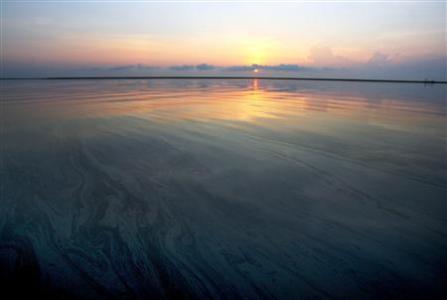Court Blocks Obama Ban On Deepwater Drilling
Country: USA
Author: Mary Rickard and Jeremy Pelofsky

An oil sheen covers the surface of Bay Jimmy near Port Sulpher,
Louisiana June 20, 2010. The BP oil spill has been called one of the
largest environmental disasters in American history.
Photo: Sean Gardner
A judge on Tuesday blocked the Obama administration's ban on deepwater drilling, complicating its efforts to improve the safety of offshore oil operations after the worst spill in U.S. history.
The White House said it would immediately appeal the judge's ruling, issued in New Orleans. Oil companies involved in offshore drilling operations had challenged the government's six-month moratorium.
A new Reuters/Ipsos poll found that most Americans still support offshore drilling, despite watching a huge slick from BP Plc's Gulf of Mexico oil spill devastate fragile wetlands and communities along the U.S. Gulf coast.
The possible scale of the ecological catastrophe was underscored when U.S. scientists said as much as one million times the normal level of methane gas has been found in some regions near the spill, enough to deplete oxygen and create a dead zone.
If such dead zones were linked to the spill they could ultimately add to BP's mounting costs.
The 64-day-old disaster has shattered investor confidence in BP, which has seen its stock price slashed in half since the start of the crisis. The British energy giant's London share price tumbled to its lowest level in 13 years on Tuesday.
After the BP well ruptured on April 20, spewing millions of gallons of crude, President Barack Obama imposed the ban on deep-sea drilling while officials checked that other wells were operating safely.
In granting a request by more than a dozen oil services companies for the ban to be overturned, Judge Martin Feldman challenged its "immense scope."
The Interior Department, which oversees offshore drilling, said despite the ruling, the firms still had to meet new safety and environmental rules before they could resume operations.
Expanding offshore drilling was among Obama's proposals to revamp U.S. energy policy. He hoped it would generate support from Republicans for more controversial aspects of his plans to fight climate change.
But he shelved that plan after the spill and White House spokesman Robert Gibbs said Obama believed that "continuing to drill at these depths without knowing what happened does not make any sense." The administration will probably ask for a stay of the court ruling as it pursues its appeal.
The court's decision was a victory for offshore energy producers like BP, Chevron Corp and Royal Dutch Shell. They have been hamstrung by the ban, and are eyeing relocating their giant rigs to other basins like Brazil.
Shares in oil drilling companies briefly spiked after the ruling but dipped again when the Obama administration said it would appeal. The S&P energy sector fell 1.3 percent.
BP's London-listed shares hit their lowest level since February 1997 on Tuesday, dropping more than 5 percent before coming off lows. U.S.-listed shares closed down 2.14 percent at $29.68. They have not traded around these levels since 1996.
In London, BP's shares have fallen 32 percent in June alone and are on track to suffer their worst month since at least 1965, according to Thomson Reuters Datastream.
GREEN GROUPS FURIOUS
The court ruling infuriated U.S. environmental groups. The Sierra Club said it would join the Obama administration in appealing it and called the ruling "a slap in the face to the communities that have been hit hard by this tragedy."
The spill has dealt a severe blow to the U.S. Gulf Coast's tourism and fishing industries and soiled large parts of a 400-mile coastline from Louisiana to Florida.
But the ruling was welcomed by Gulf Coast residents whose livelihoods depend on the oil industry.
"It takes away the uncertainty. It's going to get some people back to work immediately," said Tony Frickey, site supervisor at the Venice Port Complex in Venice, Louisiana.
BP said it had captured 25,830 barrels (1,084,860 gallons/4,106,641 liters) of oil from the ruptured well on Monday, the highest amount yet. Between 35,000 and 60,000 barrels a day are gushing from the well, according to U.S. government estimates.
Despite the spill, 56 percent of Americans believe offshore drilling is necessary for the United States to produce its own energy and not rely on other countries, while 38 percent believe it is a bad idea, according to the Reuters poll.
The poll also found about three-quarters of Americans believe neither BP nor the government responded quickly enough to the disaster.
The Obama administration has walked a tightrope in responding to public outrage over the spill and defending its own handling of the crisis against criticism that the relief effort has been too slow and ineffective.
Much of this criticism has come from local governments on the spill front line.
Billy Nungesser, president of Plaquemines Parish in southern Louisiana, said the Interior Department had ordered a halt to dredging operations aimed at creating a sand berm as a barrier to the spreading crude.
"We are being required to move our dredging site two more miles farther off our barrier coast, causing us to lose precious time in our fight," he said in a letter to Obama.
(Editing by Chris Wilson)